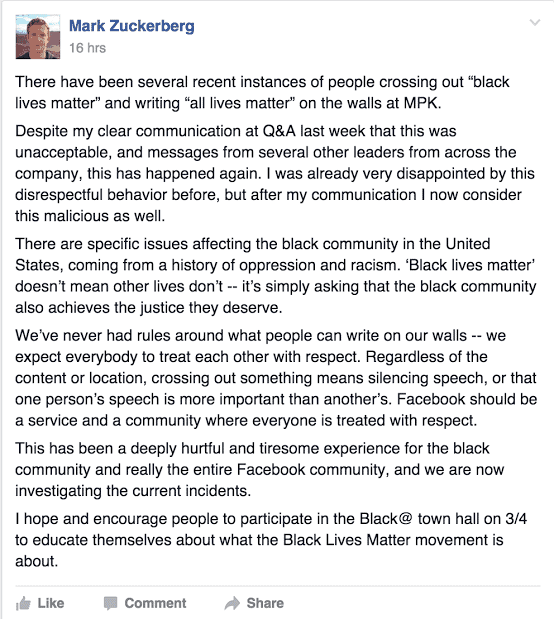

Last week, Facebook CEO Mark Zuckerberg sent out a private message to employees at the company’s Menlo Park headquarters, admonishing people for crossing out the words “Black Lives Matter” and scrawling in “All Lives Matter” instead.
Slack engineer Erica Baker has told CNNMoney that she is “exactly zero percent surprised” at Zuckerberg’s message.
Baker has previously used the term “colorless diversity” to describe the faux-meritocratic rhetoric of Silicon Valley culture.
Baker’s “zero percent” is even less than the one percent of technical roles at Facebook occupied by black people, as well as less than three percent, the quantity of non-technical Facebook employees. In 2014, 2.9% of new hires at Facebook were black.
“This has been a deeply hurtful and tiresome experience for the black community and really the entire Facebook community,” writes Zuckerberg in his memo, “and we are now investigating the current incidents.”
Zuckerberg is at least correct to make a clear distinction between “the black community” and “the Facebook community”, because there is almost no overlap between those two things, at least as far as Facebook’s workforce is concerned.
Before being hired by Slack CEO Stewart Butterfield in May 2015, Baker worked at bro-tastic Google for nine years, which she described in a memorably horrifying Medium essay in November 2014.
At Google, Baker describes having to learn “a bunch of classic rock songs so I could play Rock Band and Guitar Hero with the team”, which is approximately the least horrible thing she experienced in the workplace, along with consistently suggestive comments from co-workers, not to mention the pay differential.
When Baker suggested a social activity for the group that didn’t involve beer, which she doesn’t drink, she was voted down.
Hands-up voting appears to be a preferred method of solving problems in start-up and Silicon Valley culture. It’s also how everything got resolved in Lord of the Flies.
Shortly after her Medium essay, Stewart Butterfield retweeted a video of Baker’s taken at a protest against the verdict clearing a white police officer in the death of Michael Brown in Ferguson, Missouri, and added “Stay safe.”
Last month, the day before Martin Luther King, Jr. day in the United States, Butterfield circulated an internal memo explaining that the office would be closed in observance, and expounding somewhat on his personal feelings on the significance of the day.
Erica Baker asked Butterfield’s permission to publish the memo on Medium, for anyone to read.
“Despite the fact there have been areas of progress great and small, it is still, shamefully, far from finished,” wrote Butterfield. “And it is on all of us to see it through. There is only us, the people. And if we truly value solidarity at this company it is a good time to recognize, and remember, and recommit to standing with the people who lost their livelihoods, their limbs, and even their lives, merely asking for something as simple and basic and obvious as equal rights and equal protections under the law.”
In September 2015, Slack began releasing periodic diversity reports, detailing the company’s progress in hiring a workforce that bore a closer resemblance to reality than Facebook’s sub-three percent, or Google’s one percent of its technical workers.
Slack’s second diversity report last month divulged that 6.9% of its U.S. technical workers are black, 43% of its managerial staff women, 13% of its staff LGBTQ, 6.1% of U.S. technical staff Hispanic/Latino, among other statistics bringing it a little closer to a reflection of reality.
African-Americans comprise 13.2% of the U.S. population, and Hispanic/Latinos 17.1%.
A report by USA Today found that 2% of technology workers at seven Silicon Valley companies that have released staffing numbers are black, while 3% are Hispanic.
Meanwhile, the Computing Research Association found that 4.5% of all new recipients of bachelor’s degrees in computer science or computer engineering from research universities were African-American, and 6.5% Hispanic.
At the time of their first diversity report, Slack’s workforce consisted of a relatively modest 250 employees, but has since expanded to 385, while Slack itself is now apparently valued at $4 billion U.S., up from a measly $2.8 billion just a few months ago, as it reportedly seeks a new $150-$300 million round of investment, according to the Wall Street Journal.
Diversity has become a hot topic in the tech sector and STEM education in general, a topic which Facebook and Google have become unwittingly embroiled in owing to the homogeneity of their workplace cultures.
A year ago, Intel announced that it would attempt to implement full diversity across all aspects of its workforce.
As Slack points out in its most recent diversity report, “talking about diversity and inclusion keeps the issue front of mind for ourselves and our people. So we are going to keep talking about it. Of course, talk is not enough.”
He’s right, of course. But words do matter, as evidenced by the impulse of some Facebook employees to cross certain words out.

Leave a Reply
You must be logged in to post a comment.







 Share
Share Tweet
Tweet Share
Share




Comment